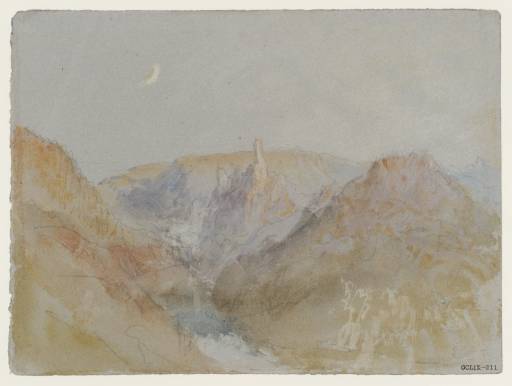Joseph Mallord William Turner Burg Hals above the River Ilz from the North, with a Crescent Moon 1840
Joseph Mallord William Turner,
Burg Hals above the River Ilz from the North, with a Crescent Moon
1840
Joseph Mallord William Turner 1775–1851
Burg Hals above the River Ilz from the North, with a Crescent Moon 1840
D24776
Turner Bequest CCLIX 211
Turner Bequest CCLIX 211
Pencil, gouache and watercolour on grey wove paper, 142 x 190 mm
Blind-stamped with Turner Bequest monogram towards bottom right
Stamped in black ‘CCLIX – 211’ bottom right
Blind-stamped with Turner Bequest monogram towards bottom right
Stamped in black ‘CCLIX – 211’ bottom right
Accepted by the nation as part of the Turner Bequest 1856
Exhibition history
1904
National Gallery, London, various dates to at least 1904 (700c, as one of ‘Three Sketches in France (colour on grey)’).
1995
Turner in Germany, Tate Gallery, London, May–September 1995, Städtische Kunsthalle Mannheim, September 1995–January 1996, Hamburger Kunsthalle, Hamburg, January–March 1996 (90, as ‘Burg Hals: Moonlight’, 1840, reproduced).
References
1904
E.T. Cook and Alexander Wedderburn eds., Library Edition: The Works of John Ruskin: Volume XIII: Turner: The Harbours of England; Catalogues and Notes, London 1904, p.639 no.700 [c], as one of ‘Three Sketches in France (colour on grey)’.
1834
A.J. Finberg, A Complete Inventory of the Drawings of the Turner Bequest, London 1909, vol.II, p.802, CCLIX 211, as ‘Ruined Castle among hills. Exhibited Drawings, no.700c, N.G.’, c.1830, p.937, CCXCII 4, as ‘Castle on rock. Exhibited Drawings, No.700c, N.G. ... (Transferred form “Rivers of France” Water Colours, No.211)’, c.1834.
1995
Cecilia Powell, Turner in Germany, exhibition catalogue, Tate Gallery, London 1995, pp.69, 81 note 42, 161 no.90, as ‘Burg Hals: Moonlight’, 1840, reproduced.
Burg Hals stands high above the village of the same name along the neck of a tight meander of the River Ilz,1 in hilly wooded countryside barely a mile due north of Passau in southern Germany (see under Tate D28993, D29006, D33871; Turner Bequest CCXCII 46, 57, CCCXLI 174, in this subsection). First recognised by Cecilia Powell,2 the jagged ruins are seen downstream to the south, almost merging in the soft evening light with the rocks on which they stand (now heavily wooded). Just below to the left, the spire of St George’s Church is lightly indicated in the village beyond.
The castle ruins are the subject of six atmospheric colour studies on both brown and grey papers (see also Tate D28960, D28997, D29011–D29012, D36162; Turner Bequest CCXCII 13, 49, 60, 61, CCCLXIV 305). They were also drawn in pencil from numerous angles in the contemporary Venice; Passau to Würzburg sketchbook (see under Tate D31391; Turner Bequest CCCX 58a); see also Tate D33667, D33669 and D33670 (Turner Bequest CCCXL 2, 4, 5) in the larger Passau and Burg Hals book, D33667 being developed with watercolour. Compare in particular D36162, looking in the same direction from nearer the castle; as Powell has observed, the present view is similar to that outlined in D31393 (CCCX 59a) in the Venice; Passau to Würzburg book.3 See also D31395 (CCCX 60a).
The waxing crescent moon adds a melancholy touch to the apparently deserted scene as the daylight fades, although Turner was in the vicinity around the middle of September 1840, when the moon was full,4 as possibly shown in a Passau sketch in the Trieste, Graz and Danube book (D30054; Turner Bequest CCXCIX 28); it is generally a moot point as to when colour was added to such sheets, so this may simply be retrospective artistic license. See also a colour study of Regensburg, which the artist reached within a day or two, with the moon shown in the same phase (Tate D36151; Turner Bequest CCCLXIV 294).
Finberg inadvertently listed this work twice in his 1909 Inventory, as happened occasionally owing to numerous works being on extended loan or otherwise dispersed at that time. In this case he seems to have taken a definite but somewhat unresolved decision to move it from his ‘Water colours on blue paper: mostly connected with the “French Rivers” series’ of about 1830, where it is listed as Turner Bequest CCLIX 211,5 to ‘Water colour sketches connected with the Meuse-Moselle-Rhine tour, and others. Nearly all ... on grey paper’, of about 1834, as CCXCII 4.6 He added a cross-reference from the latter to the former, but not vice versa. When Tate ‘D’ accession numbers were initially assigned, CCXCII 4 became Tate D28951, but the number was subsequently cancelled.
See ‘Moon Phases 1840 – Lunar Calendar for Passau, Bavaria, Germany’, timeanddate.com, accessed 21 March 2018, https://www.timeanddate.com/moon/phases/germany/passau?year=1840 .
Technical notes:
The moon is touched in with white over a stroke of yellow ochre. Loose pencil detail has been added over the colour elsewhere. The textures at the bottom right suggest stopping-out with gum arabic.
For discussion of the grey paper Turner used for this subject among others in the Passau area on grey and brown, see the overall Introduction to the tour.1
Verso:
Blank, save for slight blue-grey splashes or offsets of colour towards centre right; inscribed in pencil ‘108 c’ top left; stamped in black with Turner Bequest monogram over ‘CCLIX – 211’ towards bottom right.
Matthew Imms
September 2018
How to cite
Matthew Imms, ‘Burg Hals above the River Ilz from the North, with a Crescent Moon 1840 by Joseph Mallord William Turner’, catalogue entry, September 2018, in David Blayney Brown (ed.), J.M.W. Turner: Sketchbooks, Drawings and Watercolours, Tate Research Publication, December 2019, https://www

